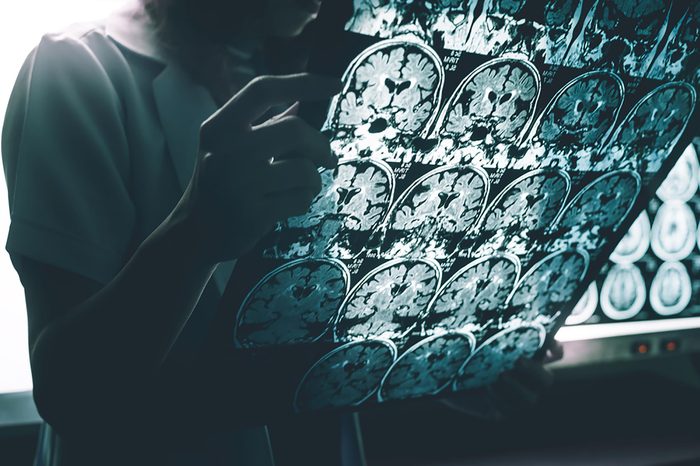
MBBS · 3.5 years of experience · India
The hardest thing watching my mother be confused, scared and frustrated because she did not understand what was going on, who people were or where she was at. My heart broke to watch this disease steal her away from everyone that loved her.
When you love someone with Dementia you lose them more and more everyday.
When they are diagnosed, when they go through different stages, when they need
treatment and when they die.
This is called “Ambigua Loss.” – Search (bing.com)
I wouldn’t wish Dementia on anyone. As the brain slowly dies, it changes physically and eventually forgets how to complete the simplest of daily tasks and who their loved ones even are.
The mind eventually forgets how to operate its own body.
They can end up lying in bed not moving and not eating or drinking.
There will be people who will scroll by this post because Dementia has not touched them.
They may not know what it’s like to have a loved one who battled or is fighting Dementia.
To Raise Awareness of this Cruel Disease, I’d like my family and friends to put this on their page today. Hold Finger on Post to Copy and Paste to Your Timeline.
A Special Thank You to All Willing to Post This On their Timeline for Dementia Awareness
A very hard thing to watch your loved one have to go through!



Alzheimer’s disease begins long before any symptoms become apparent. This stage is called preclinical Alzheimer’s. This can last many years, even for decades. The rate of progression for Alzheimer’s disease varies widely. On average, people with Alzheimer’s disease live between three and 11 years after diagnosis, but some survive 20 years or more. The degree of impairment at diagnosis can affect life expectancy. Untreated vascular risk factors such as hypertension are associated with a faster rate of progression of Alzheimer’s disease. Pneumonia is a common cause of death because impaired swallowing and aspiration of food leading to infection.
Expert opinion from Azhar Rao
MBBS · 6 years of experience · India
How Long Do People with Alzheimer’s Disease Live After Developing the Disease?
Alzheimer’s disease progresses slowly over time. Patients usually go through 3 stages
of the disease; early, middle and late. After being diagnosed with Alzheimer’s disease,
people may live as short as 4 years to as long as 20 years.
However, people living up to 20 years with Alzheimer’s disease are rare.
Most patients die within 4 to 8 years after being diagnosed.
Dementia vs. Alzheimer’s
Here’s the first thing you need to know: how to tell the difference between dementia and Alzheimer’s disease. Dementia is an umbrella term for symptoms like impaired memory and thinking that interferes with daily living; Alzheimer’s disease is a specific
type of dementia. Other types of dementia include vascular dementia, dementia with
Lewy bodies, frontotemporal dementia, Parkinson’s disease, and Huntington’s disease.
“Alzheimer’s is the most common form of dementia—about 60 to 70 percent of the time,
a patient with dementia has Alzheimer’s,” says Richard Isaacson, MD, Director of the Alzheimer’s Prevention Clinic at NewYork-Presbyterian/Weill Cornell Medical Center.
The reason you hear about Alzheimer’s most often is not only because it is the most common type of dementia, but also because the science behind Alzheimer’s is the most advanced across all dementias,” explains Dr. Isaacson.
These are some of the early signs of Alzheimer’s.

Causes of dementia are vastly different.
A medical illness, metabolic issue (like a nutritional or thyroid problem), vascular disease (like a stroke), or, rarely, infectious diseases can affect brain cells, causing dementia.
Even mad cow disease, which is very rare, can contribute to dementia, says Dr. Isaacson.
A condition called depressive “pseudodementia is another possible source. As he explains, when levels of the neurotransmitter serotonin run low, you may have trouble paying attention. And when you’re distracted, you have trouble remembering things, which can manifest as dementia.
On the other hand, Alzheimer’s has its own origins.
It’s a brain disease marked by deposits of beta-amyloid plaques and proteins called
tau that damage cells in brain regions that control functions like thinking, memory,
and reasoning. Here are the everyday habits that can increase your risk of dementia.
Multiple factors can be at play
There’s also what’s called mixed dementia, meaning there are multiple conditions
that can come together to cause dementia. “Thirty percent of the time, patients who
have Alzheimer’s also have a vascular disease that makes cognitive symptoms worse,”
says Dr. Isaacson. Alzheimer’s and dementia with Lewy bodies (in this disease, clumps
of alpha-synuclein proteins develop in the brain) have been found to occur together.

Symptoms can look very similar.
Losing your keys—again—and forgetting where you parked are basic memory problems,
so how do you know when it crosses the line to dementia or Alzheimer’s? According to the Alzheimer’s Association, in order for a person to be diagnosed with dementia, two of the following must be “significantly impaired”: memory, communication and language, the ability to focus and pay attention, reasoning and judgment, and visual perception.
When it comes to Alzheimer’s, you may forget new information or find that you have to ask family members to remember important facts you should be able to keep track of yourself.
(It’s not those little brain blips where you can’t remember the name of your second cousin and then it comes to you later—that’s normal). Research published in the Journal of Alzheimer’s Disease in 2016 also indicates that difficulty using a map may be one of the earliest warning signs of Alzheimer’s. These are some other warning signs of Alzheimer’s to watch out for.
You may be able to prevent Alzheimer’s
“We have the Alzheimer’s Prevention Clinic, and the fact that you can talk about those words together is advanced,” says Dr. Isaacson. The clinic investigates how lifestyle choices—a healthy diet, exercise, social and mentally stimulating activities, as well as everyday habits, and ample sleep can markedly reduce your risk of Alzheimer’s.
In fact, a study in 2014 published in the Lancet Neurology, reducing certain risk factors can decrease the risk of Alzheimer’s by 33 percent. The most important ways to prevent Alzheimer’s: Control diabetes and high blood pressure, reduce weight if obese, stay active, treat depression, don’t smoke, and stay in school. The Lancet, in a 2017 article, also notes that staying social (spending time with friends and family members) and managing hearing loss have been shown to be among the controllable factors that may help prevent dementia. Don’t miss these 50 other everyday habits that can decrease your risk of Alzheimer’s.

As for other types of dementia, lifestyle changes may be the best option. Treatment for vascular dementia relies on doing things that are healthy for your arteries and heart: reducing blood pressure and cholesterol, and controlling diabetes. “Managing other chronic conditions is important,” says Dr. Isaacson. “Those are a great way to press the fast-forward button on dementia.”
You can find out if you’re at an increased risk of Alzheimer’s now
If you get evaluated for Alzheimer’s, your doctor can make a diagnosis based on symptoms, a clinical history, and medical tests (to rule out causes like thyroid issues or nutritional deficiencies). Brain imaging tests like a cat scan or MRI can look for beta amylase plaques gunking up brain regions. If you’re worried that you may be developing Alzheimer’s, Isaacson and his colleagues have developed a free, short quiz that will suggest, based on name, face, and occupation recognition, whether you need further evaluation for a possible diagnosis of Alzheimer’s. The results correlate with the levels of beta-amyloid in the brain, he explains. Luckily, there’s good news: Scientists may have found the cause of Alzheimer’s—and how to reverse it.
You don’t have to be scared
Forgetting how to work the thermostat in your home, being afraid to leave your neighborhood out of fear you might not get home, or misplacing your belongings so often that it hurts your ability to get out the door can all be particularly worrisome—especially if a loved one expresses concern. If you’re worried, see your doctor, says Dr. Issacson. “Get educated, get informed, get evaluated,” he says. “The earlier the diagnosis, the earlier you can be treated. And the earlier you’re treated, the better you’ll do.” You can also help yourself by avoiding these sleep habits that are associated with a a higher risk of Alzheimer’s.
The post This Is the Difference Between Dementia and Alzheimer’s appeared first on
The Healthy. → See more questions and expert answers related to Alzheimer’s disease.
Expert opinion from Ramamurthy Bangalore
M.D., F.C.C.P., F.A.C.P., F.A.A.S.M. (Pulmonologist) · 30 years of experience · USA
Physical activity and brain health: Unveiling the role of sleep in older adults (msn.com)
An Alzheimer lives on average four to eight years after he or she has been diagnosed,
but can survive for 20 years, depending on other variables.
Getting regular exercise can help protect against mental decline in an aging brain.
But poor sleep can take away those benefits. A new study found that people who were more active, but slept less than six hours on average, had faster cognitive (mental) decline.
After 10 years, their cognitive function was equivalent to that of their more inactive peers.
“Our study suggests that getting sufficient sleep may be required for us to get the full cognitive benefits of physical activity.
It shows how important it is to consider sleep and physical activity together when thinking about cognitive health,” said lead author Dr. Mikaela Bloomberg, of University College London (UCL) Institute of Epidemiology & Health Care, in England.
“Previous studies examining how sleep and physical activity might combine to affect cognitive function have primarily been cross-sectional — only focusing on a snapshot in time — and we were surprised that regular physical activity may not always be sufficient
to counter the long-term effects of lack of sleep on cognitive health,” Bloomberg added in a university news release.

The new study included more than 8,950 people in England who were aged 50 and older.
Participants also were asked how much sleep they get on an average weeknight and were divided into three groups: those who averaged fewer than six hours; those who got the optimal six to eight hours; and long-sleepers, those averaging more than eight hours each night.
Each was also scored based on the frequency and intensity of self-reported physical activity and divided into two groups: more active (top-third of scorers), and less active.
To assess participants’ mental function, they were asked to recall a 10-word list, both immediately and after a delay.
They also took a verbal fluency test, in which they were asked to name as many animals as they could in a minute. People were excluded if they self-reported a dementia diagnosis or had test scores indicating some mental impairment.
The study found that six to eight hours of sleep per night and higher levels of physical activity were linked to better cognitive function. Those who were more active also had better mental function no matter how long they slept when the study began. The researchers noted that this changed over the 10-year study period, with those sleeping fewer than six hours having more rapid decline.
This decline was true for folks in their 50s and 60s, but those 70 and up maintained the mental benefits of exercise even with shorter sleep. “It is important to identify the factors that can protect cognitive function in middle and later life as they can serve to prolong our cognitively healthy years and, for some people, delay a dementia diagnosis,” said study co-author Andrew Steptoe of the UCL Institute of Epidemiology & Health Care.
“The World Health Organization already identifies physical activity as a way to maintain cognitive function, but interventions should also consider sleep habits to maximize long-term benefits for cognitive health.”
One limitation of the study is that participants self-reported on their sleep duration and physical activity.
The findings were published in the July issue of The Lancet Healthy Longevity.
Is it harmful to take parents with dementia out for the day? – AgingCare.com
My mother was diagnosed with dementia about 2 years ago. I quit my job to stay home and take care of her which is something I chose to do. Little did I know how awful this disease can be. It seems that if we stay at home (familiar surroundings) she doesn’t seem to act out or have major delusions. However if we go out, even to the grocery store, etc. by that evening she goes into full delusion mode. Searching the house for unknown objects, asking where her mom and dad are (they passed away 25 and 45 years ago) and she becomes very upset.
My question is, should I not take her anywhere? She always wants to go places and enjoys herself while there, but the evenings are always a mess. It is also nice that I get a chance to go out even if I have to take her with me but I’m not sure its good for her and I don’t want to cause her undue stress/harm. I would value your opinion! We have the opportunity to get Disneyland passes and would go all the time.
I think my mom would love it but again:
I don’t want to make her evenings more difficult for her.
Author: Alissa Sauer
There is nothing funny about Alzheimer’s disease. Though, research suggests laughter can affect Alzheimer’s prevention, help Alzheimer’s caregivers, and improve the quality of life for those afflicted by the disease. Is laughter really the best medicine? Learn more.
There is currently no cure for Alzheimer’s, a disease which 36 million people live with daily. As researchers continue to search for a solution, more emphasis is being placed on prevention of the disease rather than treatment. One way to prevent Alzheimer’s is to improve the health of the brain by looking for new challenges which stimulate growth.
Laughter for Alzheimer’s Prevention
Playing, laughing and being active while accepting new challenges
is a great way to keep the brain engaged and grow new brain cells, to prevent Alzheimer’s.
Researchers have also found that laughter has a wide range of health benefits which aid in Alzheimer’s prevention. Benefits of laughter include:
Heart disease prevention
Lower stress hormones
Ease of anxiety and fear
Increase in social interaction
Lower blood sugar levels
Strengthened immune system
The Benefits of Laughter for Caregivers
According to the Centers for Disease Control and Prevention (CDC), 87% of Alzheimer’s patients are being cared for by caregivers at home. The sacrifices Alzheimer’s caregivers make are great, and range from less time for family and friends and lost income due to missed work, to failing to take care of themselves.
With all the stress that comes with caregiving,
it is crucial that caregivers maintain a good sense of humor.
Strengthening the immune systems so caregivers can stay healthy
Easing tension and lightening the mood
Laughter can help caregivers cope by:
Allowing them to enjoy the moment.
Strengthening family relationships
Promoting mental health
Relieving stress
The Benefits of Laughter for Patients
People who live with Alzheimer’s and related types of dementia can suffer from confusion, frustration and depression. These strong emotions can bring anything from negative feelings to anxiety, which can often lead to behavioral problems and even aggression.
Laughter can help alleviate some of these symptoms,
improving the quality of life for those with Alzheimer’s, by:
Allowing them to redirect negative emotions.
Easing symptoms of depression.
Tempering signs of aggression.
Improving social interaction.
Reducing stress.
How has laughter benefited you or your loved one with Alzheimer’s? Share your story about how laughter has affected you or your family in the comments below.
Related Articles:
How Positive Environments Dramatically Affect Alzheimer’s Patients
How Art Therapy Enhances the Quality of Life for Dementia Patients
Horses May Improve Quality of Life for Alzheimer’s Patients
wide open spaces and alzheimer’s – Search Images (bing.com)
More information
The U.S. National Institute on Aging has more on mild cognitive impairment.
Copyright © 2023 HealthDay. All rights reserved.
Disclaimer: This is for information purposes only, and should not be considered as a substitute for medical expertise. These are opinions from an external panel of individual doctors, and not to be considered as the opinion of Microsoft. Please seek professional help regarding any health conditions or concerns.
Study Finds 15 Health and Lifestyle Factors That Could Increase Risk of Early Dementia (msn.com)
Unlocking mental agility: New study says short exercise bouts may shield against Alzheimer’s,
‘My best days may lie ahead’: I’m following the Colonel Sanders model for living in my 60s —
here’s why you should too (msn.com)
Related video: 5 things we learned about Alzheimer’s disease in 2023 (WPXI Pittsburgh)
Ask a doc: ‘How can I reduce the risk of Alzheimer’s disease?’ Here are 3 tips (msn.com)
Wide open spaces and Alzheimer’s – Search Images (bing.com)
Cancer rates are the highest in this Ohio county (msn.com)
Coconut oil and Alzheimer’s disease – Search (bing.com)
Cod Liver Oil: Ask Health Professionals (msn.com)
